Bukhari’s Manuscripts
◄ Sahih al-Bukhari transmission: 4
◄ Sahih al-Bukhari manuscripts: 12
◄ Al-Bukhari’s approach to authentication and weakening… 16
◄ Al-Bukhari’s narrators who are spoken about 18
Those described as weak… 39
◄ Evidence for selecting Al-Bukhari.. 39
◄ Al-Bukhari’s statement that he limited himself to the authentic. 41
◄ Al-Albani’s criticism.. 42
# His praise of Sahih al-Bukhari: 42
◄ The reason for the existence of some differences between Al-Bukhari’s manuscripts.. 43
◄ Al-Bukhari’s explanations.. 44
2620 Hadith/ 7377 duplicated
◄ Hadith books before Bukhari:
-
Please review the research “Writing the Prophetic Sunnah, One Hundred and One Hadith Writers” here , which includes everyone who wrote something of the hadiths of the Messenger of God, starting with the Messenger of God, may God bless him and grant him peace, excluding the books of Sunnah and famous compilations.
-
Specifically, the “Sunan books” before Al-Bukhari, i.e. arranged according to the chapters of jurisprudence, and the famous books of compilations and Musnads, are:
-
Sunan Ibn Jurayj (151 AH).
-
Muammar bin Rashid Mosque (153 AH)
-
Sufyan al-Thawri Mosque (161 AH)
-
Classified by Hammad bin Salamah (167 AH)
-
The effects of Muhammad bin Al-Hasan Al-Shaibani (189 AH)
-
Classified by Wakee’ bin Al-Jarrah (197 AH)
-
Sufyan ibn Uyaynah Mosque (198 AH).
-
Musnad of Abu Dawood al-Tayalisi (204 AH).
-
Classified by Abdul Razzaq Al-San’ani (211 AH).
-
Musnad of Asad bin Musa (212 AH).
-
Musnad of Ubaid Allah bin Musa (213 AH).
-
Musnad of Abu Ishaq al-Mutawwa’i (213 AH).
-
Musnad Al-Hamidi (219 AH).
-
Musnad Musaddid bin Musarhad (221 AH).
-
Sunan Saeed bin Mansour (227 AH).
-
Sunan Muhammad bin Al-Sabah (227 AH).
-
Classified by Ibn Abi Shaybah (235 AH).
-
Musnad of Uthman bin Abi Shaybah (239 AH).
-
Musnad of Ishaq bin Rahawayh (238 AH).
-
Musnad Ahmad (241 AH)
-
Sunan Al-Darimi (255 AH).
This is in addition to the Hadith parts and interpretations.
◄ Transmission of Sahih al-Bukhari: ◄ Manuscripts of Sahih al-Bukhari: Al-Bukhari died in 870 AD/256 AH, Al-Farbari died in 932 AD/289 AH, Al-Harawi died in 1042 AD. His manuscripts exceed 2000 manuscripts, and by adding the manuscripts of his commentaries, the number rises above 5000.
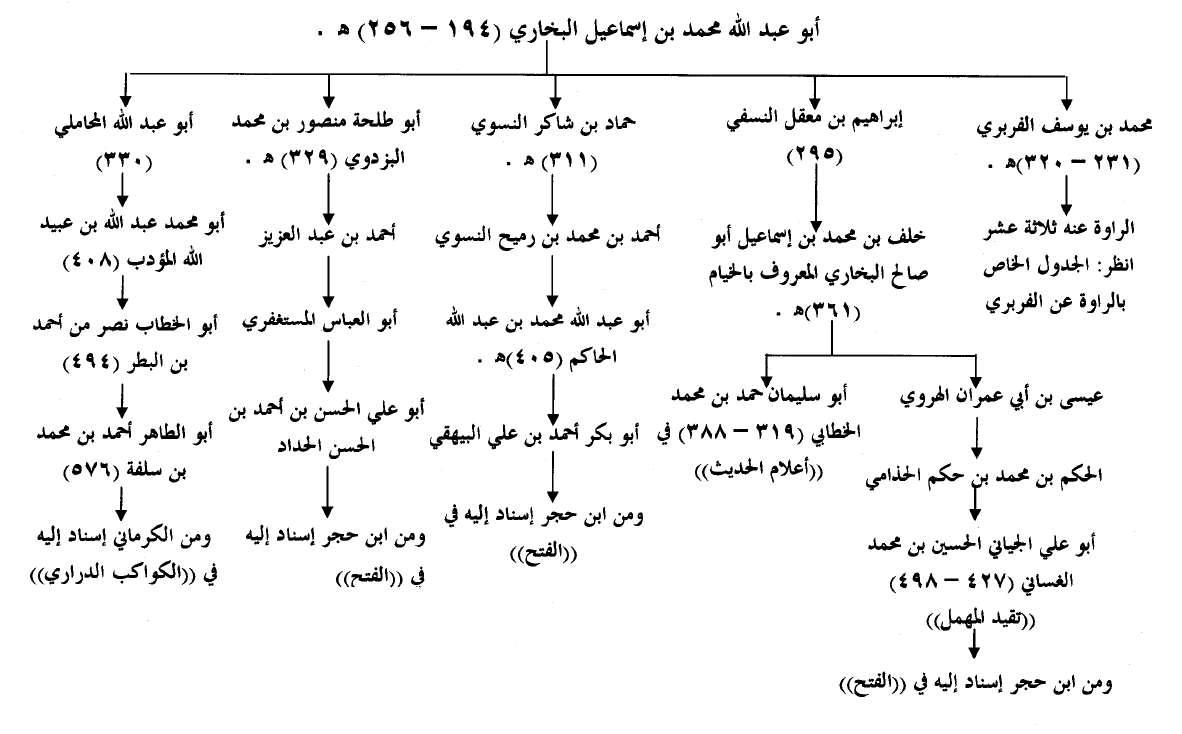
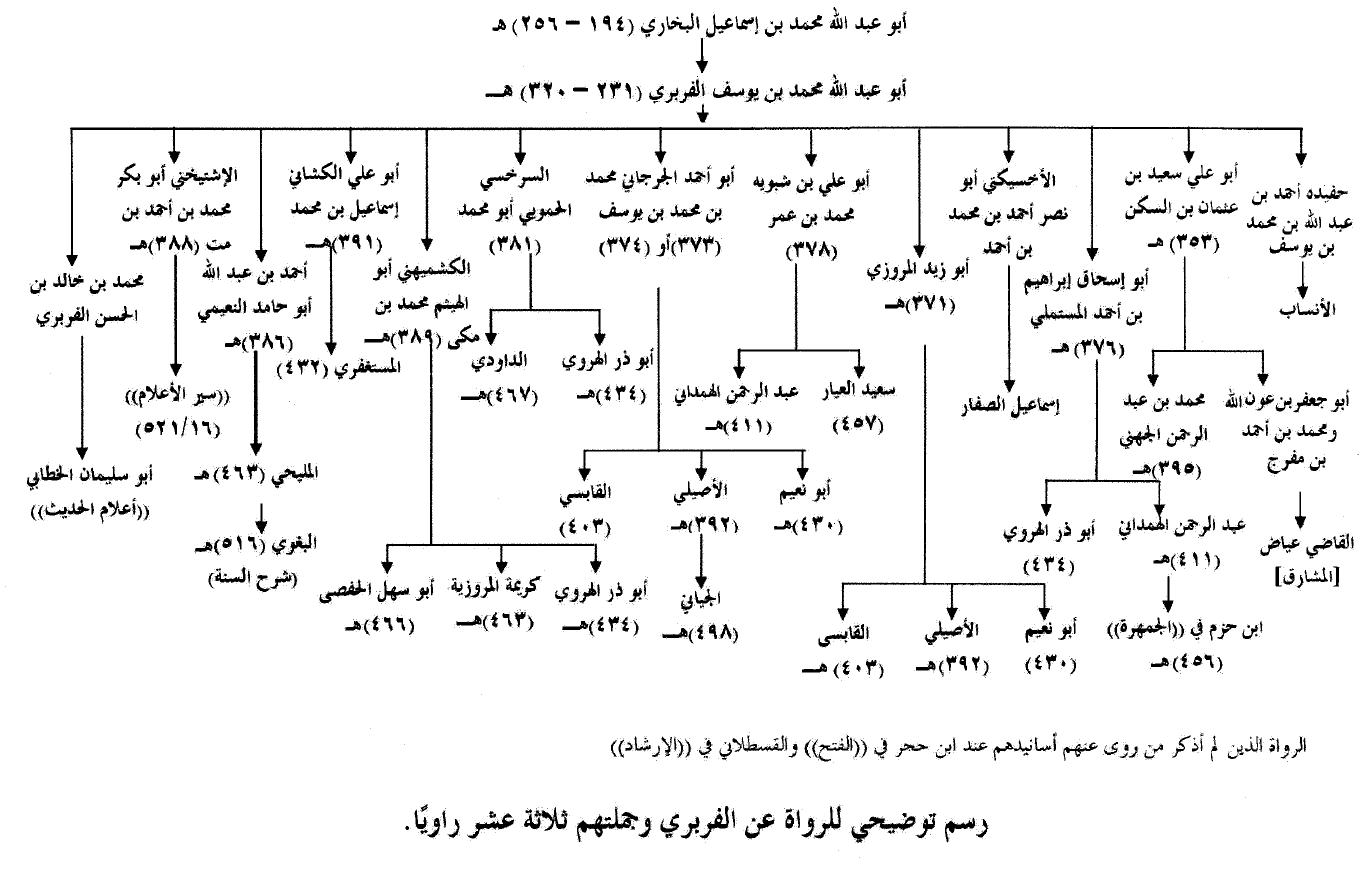
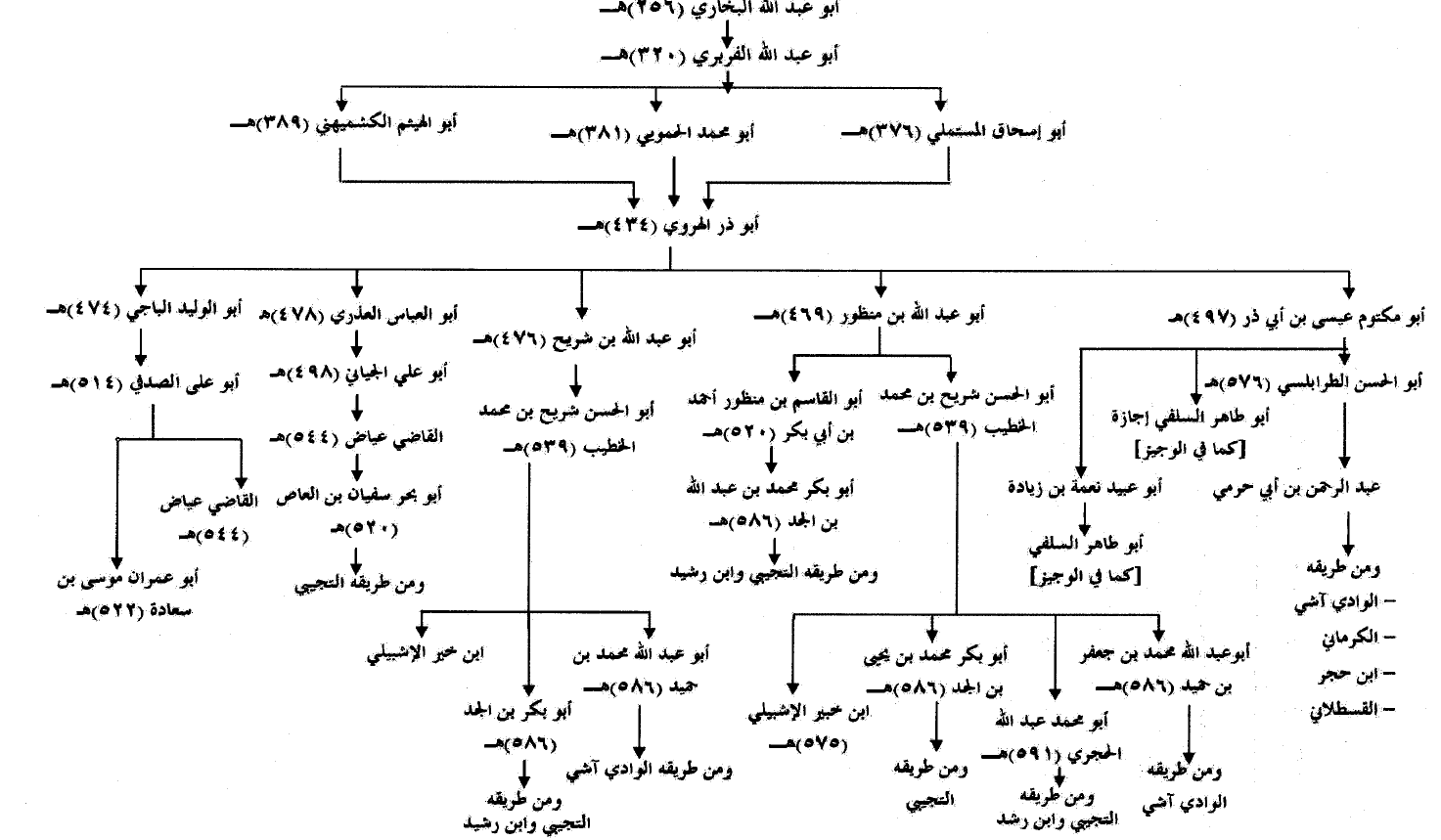
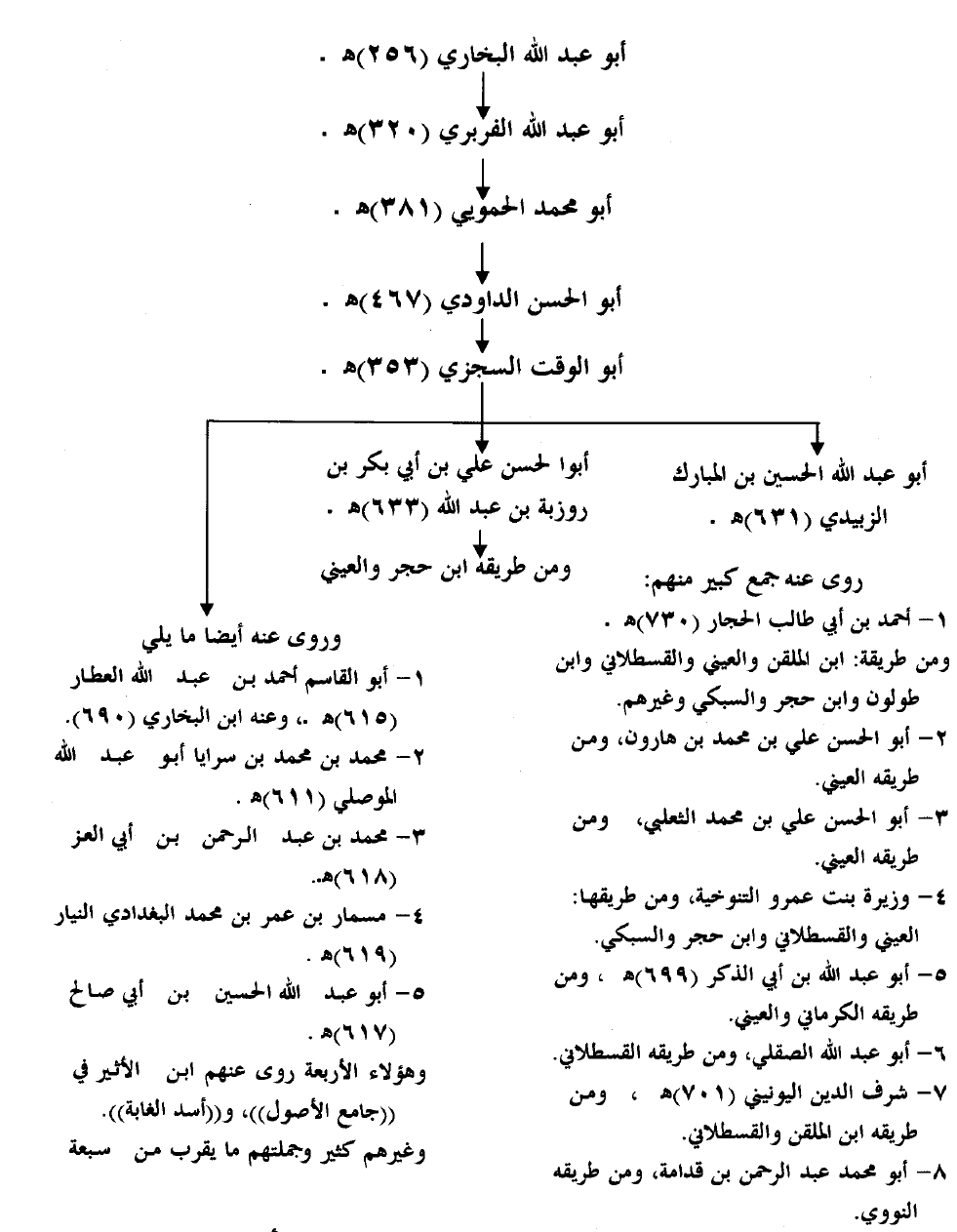
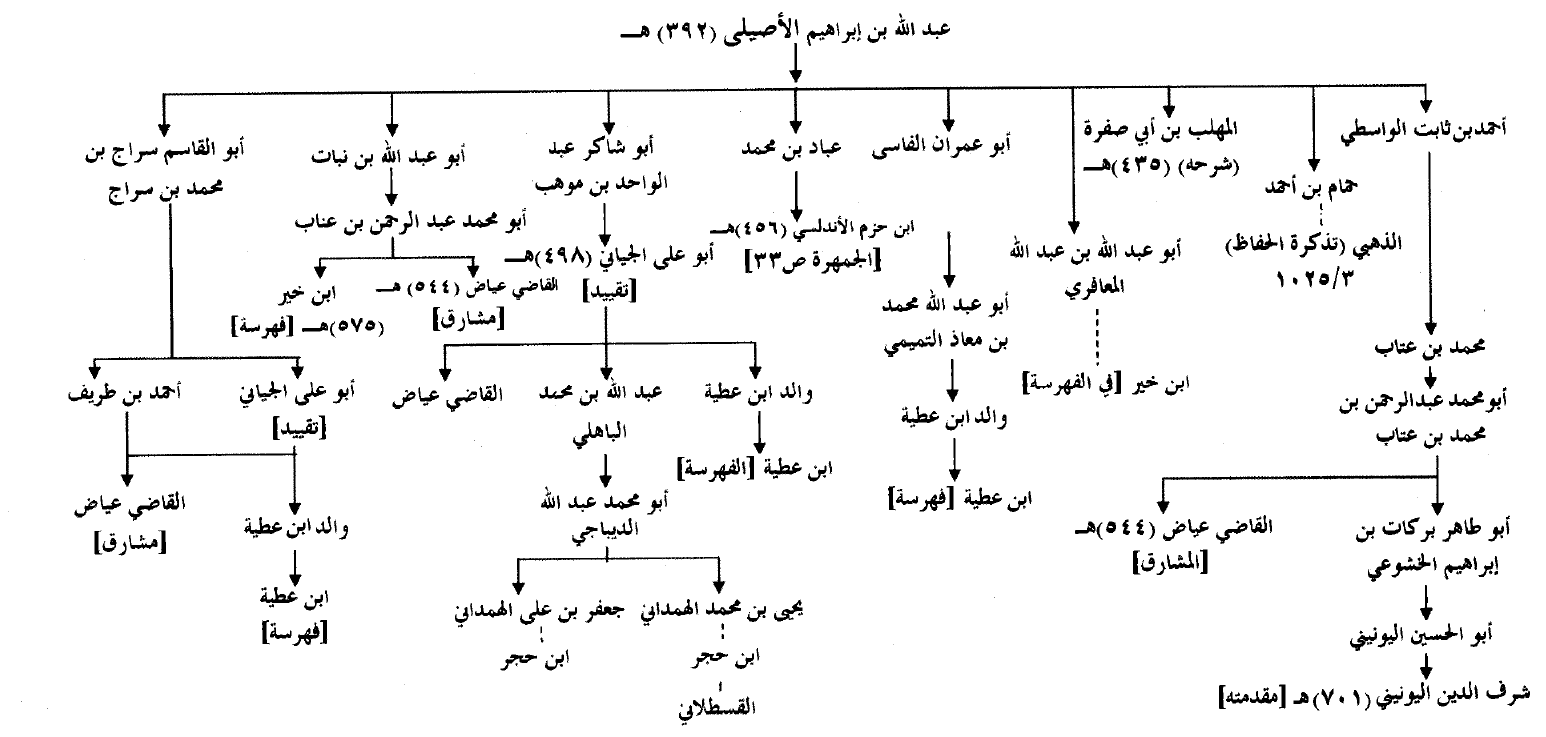
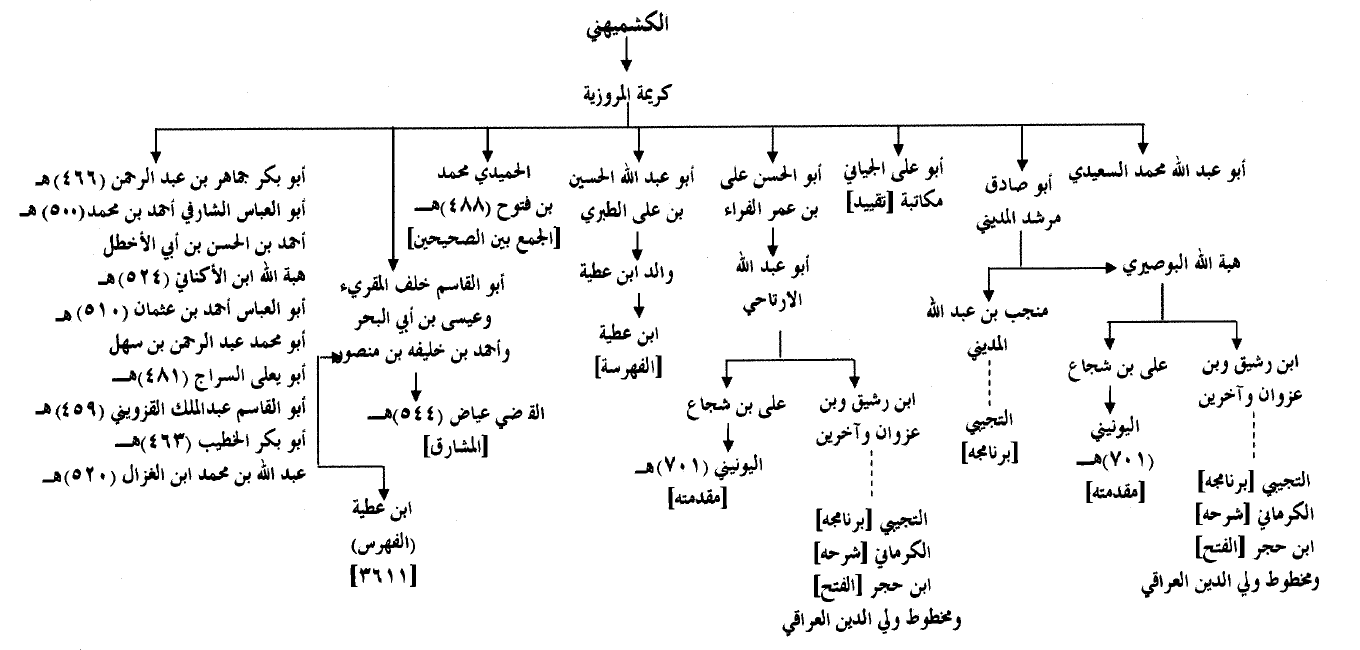
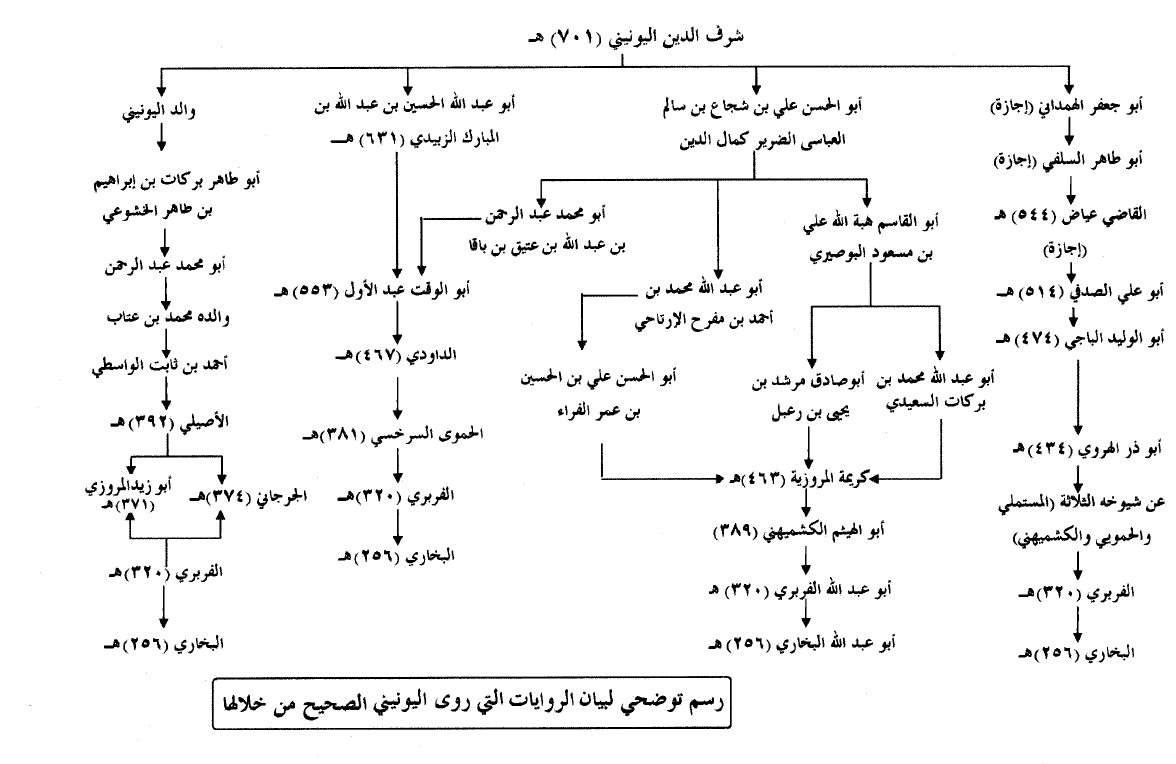
- Islamic Arabic 225 11 Al-Assili’s version on the authority of Al-Marwazi on the authority of Al-Bukhari
◦ Its history: The fourth century AH, a few years after the death of Al-Bukhari, and the same period as Al-Farbari and Al-Harawi 22
◦ Its history is early, from the time of Al-Bukhari’s student, and it is attributed to Al-Bukhari with one of the most famous chains of transmission of his manuscripts, and it is compared to two important famous copies attributed to Al-Bukhari, and it was reviewed by one of Al-Bukhari’s most famous copyists, Abu Al-Waqt.
◂ The history of the manuscript:
Alfonso Menhana says:
] The manuscript forms part of my collection of Islamic Arabic manuscripts, and is numbered Mingana Arab (Islam) 225. It is ultimately incomplete, and therefore does not bear any date, but on the basis of paleo-calligraphy it can be attributed to around 1000 AD, or to a slightly earlier date, and therefore it can probably be considered the oldest manuscript. . [3. [3
ThemanuscriptformspartofmycollectionofIslamicArabicmanuscripts,andisnumberedMinganaArab.(Isl.)225.Itisincompleteattheend,andsobearsnodate,butonpalaeographicalgroundsitmaybeascribedtoaboutAD1000,ortoaslightlyearlierdate,andmaythusbeconsideredasprobablytheearliestMS.The manuscript forms part of my collection of Islamic Arabic manuscripts, and is numbered Mingana Arab. (Isl.) 225. It is incomplete at the end, and so bears no date, but on palaeographical grounds it may be ascribed to about AD 1000, or to a slightly earlier date, and may thus be considered as probably the earliest MS.
◂ The manuscript’s hearing chain : “Al-Asili from Al-Marwazi from Al-Farbari”
and “from Al-Sarakhsi from Al-Farbari from Al-Bukhari”
” He heard this part from me from beginning to end, as read by Sheikh Ibn Al-Hajjaj … in Rajab of the year 618 (?).
On the title page there is also a long note written around 1350 AD, containing a list of sources that dealt with the authenticity of Al-Bukhari’s text in general. It is very similar to those that preceded many other manuscripts of Al-Bukhari, and differs from them only in the identity of the readers, listeners and memorizers who transmitted the text of the Sahih from time to time, orally or in writing. The first line of this note has disappeared, and three proper names are illegible in it. I will indicate these names In the version I present below, with three dots between square brackets:
… Al-Fatimi Al-Hasani Al-Kufi, may God support him, I read it all in Andalusia to Ahmad bin Muhammad bin …… may God have mercy on them, including Al-Muqri Al-Hussein …… and he served me with it from a group of his sheikhs, the closest of them to the teacher Imam Ibn Al-Asba Qusay bin Muhammad bin Abi Aseer Al-Zahri Al-Shantari, and I traveled to …… and I heard it from the jurist Judge Barkash andand the rest of the hadith scholars in Cordoba Abi Al-Qasim Khalaf bin Abdul Malik bin Bashkuwal Al-Ansari, who said that a group told us about it, including Sheikh Abu Al-Abbas Ahmad bin Abdullah Al-Qunki, known as Al-Attar, who said that the free and virtuous Karima bint Ahmad Al-Kashmihaniya told us in the Noble Sanctuary, by hearing it, she said that I heard it from the writer Abu Al-Haitam Al-Kashmihani, who said that Dhu Al-Nasabain, may God support him and grant us permission, said that Abu Al-Waqt Abdul-Awal bin Isa bin Shuaib Al-Sajzi Al-Sufi said that Jamal Al-Islam Abu Al-Hasan Abdul-Rahman bin Muhammad bin Al-Muzaffar Al-Dawudi read it to me and I heard it in Bushanj in the year four hundred and sixty-five. Abu Muhammad Abdullah bin Ahmad told us. Ibn Hamuwayh al-Sarakhsi said: Abu Abdullah Muhammad ibn Yusuf ibn Matar al-Farbari told us, the hadith master Abu Abdullah Muhammad ibn Ismail ibn al-Mughira al-Bukhari ibn… [4 4
And the copyist said:
“ Abu Zaid Muhammad ibn Ahmad al-Marwazi told us, he said: Muhammad ibn Yusuf al-Farbari told us, he said: Muhammad ibn Ismail al-Bukhari told us, he said: He told us, etc. ” 55
Manjana continues:
“We will suggest at the end of this study that the author of this manuscript is al-Asili, who is one of the most important known copies of al-Bukhari.” 66
Third: The contradictions that characterize the text of this manuscript compared to its text in other manuscripts and printed texts are also reflected in the style of the wording of the Sahih, which sometimes shows significant differences in its wording. I will quote here the text of one of the chapters of Sahih al-Bukhari from the Book of Hajj, as it appears in the fully authoritative and written edition printed in Cairo in 1345 AH, along with the corresponding chapter as it appears in our manuscript:
◂ The copies to which the manuscript was compared:
-
Copy in Abi Al-Waqt handwriting
-
Copy in the dictating handwriting
Manjana says:
“ The vertical writing on the right margin of the manuscript is important because its author Muhammad ibn Ahmad al-Mus’abi states that he compared the text of the present manuscript with a copy copied from the handwriting of Abu al-Waqt, and another copy in the handwriting of Abu Dharr, and he recorded the differences in the margin of the manuscript. This note, which can be attributed to the end of the fourteenth century AD, is as follows:
Muhammad ibn Ahmad al-Mus’abi said: I compared this copy of mine with a copy corresponding to an original in the handwriting of Abu al-Waqt, and I learned from him the qat and when he had omitted the qat, he would know that. We had with us a copy of the original of Abu Dharr, so whatever was in it of disagreement about it, then it is his, and Allah is the Grantor of success. And whatever was against it, then it is his copy… Abu al-Waqt and Abu Dharr, as we shall see, are two of the best narrators of Sahih al-Bukhari .” 77
◂ Abu al-Waqt reviewed it:
Manjana says:
“ The marginal notes on pages 131 and 136, dated 744 and 745 respectively, confirm the importance of the manuscript, as they indicate that it was read before Sheikh Taj al-Din Muhammad ibn Uthman ibn Umar al-Bilbisi. Moreover, the inscription on the right side of page 36 seems to indicate the fact that Abu al-Waqt had also seen the manuscript .” 88
-
OP.801 , The Popular Library of Cyril and Methodius, Sofia, Bulgaria, from 407 AH/1016 AD (146 years after al-Bukhari, 84 years after al-Farbari, and at the same time as al-Harawi) 99 , for information and to download the manuscript here
-
Berlin 1156 , dated 424 AH/1033 AD (163 years after Al-Bukhari and 100 years after Al-Farbari, and at the same time as Al-Harawi).
-
Mortiz, pl. 128 , dated 495 AH/1102 (232 years after Al-Bukhari, 170 years after Al-Farbari, and 60 years after Al-Harawi).
◄ Al-Bukhari’s method of authentication and weakening
General conditions:
-
The condition of Islam is the condition of performance, not the burden: as evidenced by two hadiths narrated by Jubayr ibn Mut’im, who bore them as a disbeliever and paid them as a Muslim, the hadith of Surat At-Tur, and the hadith of Al-Hams (with a ha’).
-
Mind.
-
Justice and precision in all the men in the chain of transmission, and freedom from irregularity and defect. (By induction from the state of Bukhari’s narrators).
-
In what is neither obligatory nor recommended, the mind is at the time of bearing it and puberty is at the time of performing it : as evidenced by the hadith of Al-Mujjah by Mahmoud bin Al-Rabi’, who bore it when he was five years old.
-
In it are duties, recommended acts, disliked acts, and forbidden acts, puberty in terms of endurance and performance : as evidenced by the hadith of Ibn Abbas about praying in Mina without a wall, and Ibn Abbas had reached puberty.
-
Selecting the authentic narrations of the weak narrator.
-
The occasional forgetfulness of a trustworthy person does not detract from his integrity, as in the hadith of Amr ibn Dinar on the authority of Abu Ma’bad on the authority of Ibn Abbas regarding the takbir after the prayer. Abu Ma’bad later denied that he had narrated it to Amr, he forgot.
-
The trustworthy person who enters the Sultan’s council and whose speech is acceptable . Such as (Hamid Al-Tawil, Ahmed bin Waqid Al-Harrani, Hamid bin Hilal Al-Adawi, Khalid bin Mahran Al-Hadha’a, Asim Al-Ahwal, Abdullah bin Dhakwan, Marwan bin Al-Hakam.)
-
It is permissible to narrate from someone who takes a fee for hadith . It was narrated from (Al-Fadl bin Dukayn, Affan bin Muslim, Yaqoub Al-Dawraqi, Hisham bin Ammar), who were among those who took a fee.
-
It is permissible to narrate from the proponents of minor innovations that do not constitute disbelief . He narrated from some Shiites and Murji’ites, and a Shiite is someone other than a Twelver Shiite.
-
Considering the totality of the methods and chains of transmission, not the chain of transmission being documented alone .
-
He narrates from Al-Muqal on the condition that he follows up on it or links it with trust, as in the case of the narrators who narrated it and were accused of ignorance, as will come.
-
It is permissible to prove that a companion was a narrator of a single narration, provided that he is followed: He narrated from 10 companions who were not attested to as companions except for one trustworthy follower, that is, the one who narrated the hadith from them, and all of them were followed by hadiths from other companions.
-
The narration is from a trustworthy person who was weak in a sheikh other than this sheikh (Al-Rabi’ bin Yahya bin Muqsim, Salam bin Abi Mut’i’ Al-Khuza’i, Muammar bin Rashid).
-
Narration from a trustworthy person who is weak in a sheikh from this sheikh on the condition that it is coupled (Khalas bin Amr al-Hijri, weak on the authority of Ali bin Abi Talib, two hadiths were narrated from him coupled with Muhammad bin Sirin.)
-
Narrating from the weak by selecting the authentic hadith from its written sources (Ismail bin Uwais).
-
The narration is about a trustworthy person who became confused at a time other than his usual time of confusion (Jarir bin Hazim, Hajjaj bin Muhammad Al-Awar, Husayn bin Abdul Rahman Al-Salami).
-
Narrating from a weak hadith that is not subject to a debt, i.e. in hadiths other than rulings (such as narrating the hadith of Uwais bin Abdullah Abu al-Jawza’ for the hadith of Ibn Abbas, “Al-Lat was a man who kneaded gruel.”; and Abi bin al-Abbas bin Sahl bin Saad on the authority of his father, “The Prophet had a horse in our garden called al-Laheef.”)
-
The narration of a trustworthy person who was wounded by someone because he narrated from his book and not from memory, because he is not to be criticized. (Thamama bin Anas).
-
The narration is from a trustworthy person who narrates with permission (Al-Hakam bin Nafi Abu Al-Yaman).
◄ Narrators of Bukhari who are spoken about
Rule ] All the hadiths that are being discussed were transmitted through other authentic chains of transmission [
$ Those whose justice is being challenged for heresy
- Those accused of Shiism (9 people):
1Ismail bin Aban al-Warraq al-Azdi, Abu Ishaq or Abu Ibrahim al-Kufi.
2Asid bin Zaid bin Nujayh al-Jamal al-Hashemi
. 3Khalid bin Mukhallad al-Qatwani Abu al-Haytham al-Bajali.
4Saeed bin Katheer bin Ufayr; Ibn Muslim al-Ansari; Abu Uthman al-Masri.
5Ibad bin Yaqoub al-Rawajni; al-Asadi; Abu Saeed al-Kufi.
6Ubaid Allah bin Musa bin Abi al-Mukhtar al-Absi; Abu Muhammad al-Kufi.
7Ali bin al-Jaad bin Ubaid al-Juhi; Abu al-Hasan al-Baghdadi.
8al-Fadl bin Dukayn; Abu Naeem al-Mala’i al-Kufi al-Ahwal.
9Malik bin Ismail bin Dirham, and it is said bin Ziyad, bin Dirham, Abu Ghassan, Al-Nahdi, their client, Al-Kufi, Al-Hafiz, Ibn Bint Hammad bin Abi Sulayman (d. 219 AH) - Those accused of predestination:
10Abdullah bin Amr Al-Tamimi, Al-Minqari, their client, Abu Muammar, Al-Maqad, Al-Basri (d. 224 AH)
11Khallad bin Yahya bin Safwan Al-Salami, Abu Muhammad, Al-Kufi (d. 213 AH)
12Yahya bin Saleh Al-Wahhazi, Abu Zakariya, and it is said Abu Saleh, Al-Shami (d. 222 AH) - Stopped in the Qur’an:
13Ibrahim bin Al-Mundhir Al-Asadi, Al-Hizami, Abu Ishaq, Al-Madani (d. 236 AH)
14Ali bin Abi Hashim bin Tabrakh, with a broken silent letter and a silent unified letter, Al-Baghdadi
and the Shiites other than the Rafidites, the Shiites are those who prefer Ali over Uthman, may God be pleased with him, or They stop at Muawiyah, may God be pleased with him, and they do not mean the Shiite Imamis.
The rest of them, their innovation does not impugn their truthfulness as long as it is proven, for the point is the truthfulness, and all of them were followed in their hadiths.
$ Those who are impugned because of their ignorance
1Ahmad bin Al-Muqaddam bin Sulayman bin Al-Ash’ath Al-Ajli, Abu Al-Ash’ath (d. 253 AH)
Abu Dawud impugned him in terms of his chivalry with the story of the free man, and it is not influential; Abu Ahmad ibn Adi al-Jurjani documented him
: He is one of the people of truthfulness. The imams of the people narrated from him
. Abu Hatim al-Razi: He is trustworthy in hadith and his status is trustworthy.
Abu Dawud al-Sijistani: I do not narrate from Abu al-Ash’ath, meaning Ahmad ibn al-Muqaddam. I said why? He said because he taught the licentious.
Abu Arubah al-Harrani: Ahmad ibn Shu’ayb praised him
He is not bad.
Ibn Hajar al-Asqalani: He is trustworthy and a hadith narrator. Abu Dawud criticized his chivalry for joking.
Ibn Abd al-Barr al-Andalusi:Trustworthy. Salih ibn Muhammad Jazra: Trustworthy.
Muhammadibn Ishaq ibn Khuzaymah: Astute, a hadith narrator. Muslim ibn al-Qasim al-Andalusi:The authors of Tahrir Taqrib al-Tahdhib documented him: Trustworthy. 2Abd al-Rahman ibn Yunus ibn Hashim al-Rumi, Abu Muslim, al-Mustamli, al-Baghdadi, a client of Abu Ja’far al-Mansur (d. 225 AH). They differed about him; al-Bukhari only narrated two hadiths from him and they have corroborating evidence with him. Abu Ahmad al-Hakim: He is not reliable according to them.Abu Hatim Al-Razi: Trustworthy.Abu Dawud Al-Sijistani: It is permissible to punish those who consider drinking permissible.Ibn Hajar Al-Asqalani: Trustworthy. They criticized him for his opinion, and once: Al-Bukhari narrated one hadith from him. Follow-up.
Muhammad bin Saad, the scribe of Al-Waqidi: He dictated to Ibn Uyaynah and Yazid bin Harun and traveled in search of hadith and traveled in it, and he heard a lot
Muhammad bin Abdul Rahim Sa’iqa: His command is not praised, and he was not satisfied with it
3Bayan bin Amr Al-Bukhari, Abu Muhammad, the worshipper (d. 222 AH)
They said that he is unknown, but more than one person authenticated him; Al-Bukhari narrated 4 hadiths from him, all of which were followed by others
Abu Ahmad bin Adi Al-Jurjani: A great scholar
Abu Hatim bin Hibban Al-Basti: A follower of the Sunnah and virtue
Ibn Hajar Al-Asqalani: A truthful, great worshipper, once: Abu Hatim ignored him and others recognized him, he is not unknown. Those who narrated from him were Al-Bukhari, Abu Zur’ah and Ubaid Allah bin Wasil Al
-Daraqutni responded to Abu Hatim’s statement in Al-Mu’talif wa Al-Mukhtalif and said: The responsibility for the hadith is on others because he was not the only one who narrated it
Ali bin Al-Madini: He praised him.
4- Ismail bin Abdullah bin Abdullah bin Uwais bin Malik bin Abi Aamer Al-Asbahi , Abu Abdullah bin Abi Uwais, Malik’s nephew and relative (d. 226 AH).
Al-Bukhari narrated 239 hadiths from him; Al-Bukhari mentioned 217 hadiths that were followed by him; and he was followed by him in 20 hadiths outside of Al-Bukhari; and he was unique in two hadiths that have authentic evidence [10].
5Abbas bin Al-Hussein Al-Qantari, Abu Al-Fadl, Al-Baghdadi, and it is said Al-Basri (d. 240 AH).
Abu Hatim did not know him, so he said that he was unknown; Abdullah bin Ahmad and Ahmad trusted him. Al-Bukhari only narrated two hadiths from him, both of which were followed by him.
Ahmad ibn Hanbal: Ibn Hajar al-Asqalani mentioned him well
: Trustworthy, and once: Abu Hatim said unknown, if he meant the specific, al-Bukhari, Musa ibn Harun al-Hammal, al-Hasan ibn Ali al-Maamari and others narrated from him, and if he meant the state, Abdullah ibn Ahmad ibn Hanbal trusted him and Ahmad mentioned him well, and he has two hadiths in Sahih
Abdullah ibn Ahmad ibn Hanbal: Trustworthy
6Muhammad ibn al-Hakam al-Marwazi, Abu Abdullah, al-Ahwal (d. 223 AH)
Abu Hatim said unknown; Ahmad and his son Abdullah considered him trustworthy, and Ibn Hibban considered him trustworthy, and al-Dhahabi transmitted his trustworthiness, and Ibn Hajar agreed with him, al-Bukhari narrated two hadiths from him, both of which were followed by him.
Ahmad ibn Muhammad al-Khalal: He had heard from Abu Abdullah, and died before him, and I do not know anyone with a greater understanding than Muhammad ibn al-Hakam al-Ahwal in what he asked, in debate, argumentation, knowledge, and memorization, and Abu Abdullah would reveal some of the fatwas to him, but he would not reveal them to everyone, and he was special to Abu Abdullah.
Ibn Hajar al-Asqalani: One of the teachers of al-Bukhari, Abu Hatim did not know him, so he said that he was unknown. I said that al-Bukhari knew him, but Abu Hatim did not know him, and others knew him, and he is trustworthy and virtuous. He said in al-Tahdheeb: The author of al-Zuhrah claimed that he was attributed to his grandfather, and that he is Muhammad ibn Abdah ibn al-Hakam, and that al-Bukhari narrated four hadiths from him
. Al-Dhahabi: Trustworthy.
7Muhammad ibn al-Salt al-Basri, Abu Ya’la, al-Tawzi (2) (d. 228 AH).
Ibn Hazm said about him that he is unknown, and Ibn Hazm’s opinion is worthless. Others trusted him. Al-Bukhari narrated one narration from him that was followed.
Abu Hatim al-Razi: Trustworthy .
Abu Hatim ibn Hibban al-Basti: He was mentioned in al-Thiqat
by Abu Zur’ah al-Razi: Trustworthy, he used to dictate to us from memory the interpretation and other things, and perhaps he made a mistake.
Abu Muhammad ibn Hazm al-Dhahiri: Unknown.
Ibn Hajar al-Asqalani: Trustworthy, but makes mistakes, and once: One of the teachers of al-Bukhari, Abu Zur’ah weakened some of his hadiths.
Al-Husayn ibn Muhammad al-Jayyani: One of the teachers of al-Bukhari.
Al-Darqutni: Trustworthy.
The compilers of Tahrir Taqrib al-Tahdhib: Trustworthy, as a group of trustworthy people narrated from him, including al-Bukhari in Sahih al-Bukhari and Abu Hatim. As for the statement of Ibn Hazm, it is not worth hearing it
, and their accuracy is challenged.
- Ismail bin Abdullah bin Abdullah bin Uwais bin Malik bin Abi Aamer Al-Asbahi , Abu Abdullah bin Abi Uwais, Malik’s nephew and relative (d. 226 AH)
Al-Bukhari narrated 239 hadiths for him; Al-Bukhari mentioned 217 consecutive hadiths for him; and he was followed in 20 hadiths outside of Al-Bukhari; and he was unique in two hadiths that have authentic evidence [11]
- The hadiths that were transmitted exclusively by Al-Bukhari on the authority of Ismail bin Uwais are only two hadiths :
]1[- Sahih Al-Bukhari (1/56, T. Al-Baghdadi)
“120 - Ismail narrated to us: My brother narrated to me, on the authority of Ibn Abi Dhi’b, on the authority of Sa’id Al-Maqburi, on the authority of Abu Hurairah, who said:
I memorized two vessels from the Messenger of God, may God bless him and grant him peace. As for one of them, I spread it, and as for the other, if I spread it, this throat would be cut off .”
- Thabit bin Muhammad Al-Abed, Abu Muhammad, Al-Shaibani, and it is said Al-Kanani (d. 215 AH)
Some have criticized its accuracy, but others have confirmed it. Al-Bukhari narrated two narrations from him, both of which have corroborating evidence.
Abu Ahmad ibn Adi al-Jurjani: A muezzin from the people of Absikon. In my opinion, he is one of those who do not intentionally lie, but he may make mistakes. He is often confused about his hadiths, so he narrates them according to what he likes. Ascetics and righteous people are often confused about them, so they narrate them according to their good intentions.
Abu Hatim al-Razi:
Trustworthy.
Al-Dhahabi: Trustworthy. Muhammad ibn Sa`d, the scribe of al-Waqidi: Trustworthy.
Compilers of Tahrir Taqrib al-Tahdhib: Trustworthy, good in hadith, from the teachers of al-Bukhari. Because of the mistake, he was lowered to the level of the truthful. Muteen al-Hadrami
:
Trustworthy. Supporting evidence:
“Musnad Ahmad” (16/562, al-Risalah edition):
“10959 - Ali ibn Thabit narrated to us, Jafar narrated to me, on the authority of Yazid ibn al-Asamm, who said: Abu Hurayrah was told: You have said a lot, you have said a lot. He said: If I were to tell you everything I heard from the Prophet, may God bless him and grant him peace, you would accuse me of being a liar, and you would not have debated me . Sahih al-Bukhari (6/2589, T al-Baghdadi): “6649 - Musa ibn Ismail narrated to us: Amr ibn Yahya ibn Said ibn Amr ibn Said narrated to us: My grandfather told me: I was sitting with Abu Hurayrah in the mosque of The Prophet (peace and blessings of Allah be upon him) was in Medina, and Marwan was with us. Abu Hurairah said : I heard the Truthful, the Trusted One say: “The destruction of my nation will be at the hands of young men from Quraysh.” Marwan said: “May the curse of Allah be upon them, young men.” Abu Hurairah said : “If I wanted to say: Banu So-and-so and Banu So-and-so, I would have done so.” So I used to go out with my grandfather to the Banu Marwan when they were kings in the Levant. When he saw them as young boys, he would say to us: Perhaps these are among them? We said: You know best . “Hilyat al-Awliya’ wa-Tabaqat al-Asfiya’ - Sa’ada edition (1/381): “Abu Bakr ibn Khallad told us: Al-Harith ibn Abi Usamah told us: Katheer ibn Hisham told us: Ja’far ibn Burqan told us: I heard Yazid ibn al-A’sam say: I heard Abu Hurairah say: They say: You have said too much, O Abu Hurairah. By the One in Whose Hand is my soul, if I told you everything I heard from the Messenger of God, may God bless him and grant him peace, I would throw scum on your face, and then you would not debate me . ” “Hilyat al-Awliya’ wa-Tabaqat al-Asfiya’ - Sa’ada edition (1/381): “Ibrahim ibn Abdullah told us: Muhammad ibn Ishaq told us: Qutaybah ibn Sa’id told us: Umar ibn Abdullah al-Ru’i told us: My father told me on the authority of Abu Hurairah. He said: I memorized five sacks from the Messenger of God, may God bless him and grant him peace, and I brought out two sacks from them. If I brought out the third, you would have stoned me. “ Musnad al-Bazzar = al-Bahr az-Zakhar” (15/165): “8517 - Muhammad ibn Jawwan ibn Shu’bah told us: Bahlool ibn Muwarriq told us: Ibn Abi Dhi’b told us, on the authority of Sa’id, on the authority of Abu Hurayrah, who said: I memorized from the Messenger of God, may God bless him and grant him peace, I think he said: Two sacks. As for one of them, I spread it among the people, and as for the other, if I spread it, my throat would be cut off. ” ]2 [Sahih al-Bukhari (5/1953, al-Baghdadi edition):
4789 - Ismail bin Abdullah narrated: My brother narrated to me, on the authority of Sulayman, on the authority of Hisham bin Urwah, on the authority of his father, on the authority of Aisha , may God be pleased with her, who said :
I said, O Messenger of God, tell me, if you were to descend into a valley in which there was a tree from which food had been eaten, and you found a tree from which no food had been eaten, in which of them would you graze your camel? He said: (In the one from which food had not been grazed). It means that the Messenger of God, may God bless him and grant him peace, did not marry any virgin other than her .
- Al-Bukhari narrated from him from his original sources, not from his memory :
Ibn Hajar said: “ We have narrated in Manaqib al-Bukhari with a sound chain of transmission: that Ismail brought out his originals for him, and gave him permission to select from them, and to teach him what he narrated so that he would narrate it and ignore what was other than it. This indicates that what al-Bukhari brought out from him is from his authentic hadith, because he wrote from his originals. Based on this, nothing of his hadith can be used as evidence other than what is in the Sahih, because of what al-Nasa’i and others have criticized, unless someone else shares it with him, in which case it is considered.” IbnHajar,Hadyal−Sari410 Ibn Hajar, Hady al-Sari 410
- Al-Dhahabi said about him:
(He was the scholar of the people of Medina and their encourager of his time, but his memory and mastery were deficient. Had it not been that the two sheikhs used him as evidence, his hadith would have been moved from the level of authentic to the level of good) ( [12] ) .
Al-Hafiz Ibn Hajar, may God have mercy on him, said : (He is truthful, but made mistakes in the hadiths of those he memorized) ( [13] ) .
$ Among those who criticized them was Al-Bukhari, who included them in his collections.
- Ibrahim bin Aaidh bin Mudlij Al-Ta’i:
- He was deemed weak by: Al-Bukhari and Al-Tirmidhi due to the postponement, and Al-Aqili and Al-Tirmidhi.
- He was deemed trustworthy by: Ibn Ma’ni, Abu Hatim, Al-Nasa’i, Al-Ajli and Abu Dawud.
Al-Bukhari narrated one authentic hadith from him for others.
- Thabit bin Mohammed Al-Abed:
-
It was authenticated by: Yahya bin Ma’in, Abu Hatim, and Ibn Hibban.
-
Its weakness: Al-Darqutni, Al-Bukhari and Al-Hakim.
Al-Bukhari narrated the hadith, “He is not one of us who strikes the cheeks…” and Abd al-Rahman ibn Mahdi followed him on the authority of Sufyan on the authority of al-A’mash. And the hadith, “When the Prophet prayed at night…” and Sufyan al-Thawri and Ibn Jurayj followed him on the authority of Sulayman al-Ahwal.
- Husayn bin Abdul Rahman Al-Salami (Abu Al-Hudhayl Al-Kufi).
-
It was authenticated by: Ali bin Al-Madini, Abu Zur’ah, Ibn Abi Hatim, and Yahya bin Ma’in.
-
Its weakness: Al-Bukhari, Al-Aqili, and Ibn Adi.
He took it out for him:
-
“O Abdullah bin Omar…” And he followed him: “And Asim bin Ali said: Asim bin Muhammad told us, I heard this hadith from my father, but I did not memorize it, so Waqid corrected it for me, on the authority of his father, who said: I heard my father saying: Abdullah said:”
-
“When we climbed, we grew up.”
-
“The nations were presented to me…” and it is correct for others.
-
“The Messenger of God and Abu Marthad sent me…” He continued: Ali bin Abdullah told us: Sufyan told us: Amr bin Dinar told us
-
“They were named after me….” He continued: “Malik bin Ismail told us: Zuhair told us, on the authority of Humayd,”
-
Ibad bin Rashid Al Tamimi:
-
Its weakness: Al-Bukhari, Ibn Mahdi, and Yahya bin Saeed Al-Qattan.
-
It was authenticated by: Ahmad bin Hanbal, Al-Ajli, and Ibn Abi Hatim.
He narrated the hadith: “I had a sister who was engaged to me…” Narrated by: Yunus, on the authority of Al-Hasan, on the authority of Maqal.
- Ata bin Abdullah Abu Muslim Al-Khorasani:
-
It was deemed weak by Al-Aqili, Ibn Hibban, and Al-Bukhari.
-
It was authenticated by: Ibn Aqil, Al-Darqutni, Ahmad, Al-Nasa’i, and Ya’qub bin Shaybah.
Al-Bukhari mentioned it on the authority of Ibn Abbas with the wording “Ata’” and did not clarify which of the two Ata’s was Ibn Abi Rabah or Ibn Abdullah. If it was the second, then it is weak, and if it was the first, then it is trustworthy.
- Quraish bin Anas:
-
Bukhari weakened it.
-
It was authenticated by: Ibn Al-Madini and Abu Hatim.
He narrated one hadith on the authority of Al-Hasan on the authority of Samurah regarding the Aqeeqah, and it is authentic according to others.
- Kahams bin Al-Munhal whispered:
Al-Bukhari narrated one hadith that was not attributed to him.
- Mohammed bin Salim Abu Hilal Al-Rasibi:
Abu Hatim al-Razi: Authentic hadith narrator
Abu Hatim ibn Hibban al-Basti: His nickname is Abu Uthman, and it has also been said that he is Abu Hilal
ibn Hajar al-Asqalani: Trustworthy
Yahya ibn Ma’in: Trustworthy
Al-Bukhari: Weak.
Al-Bukhari did not narrate anything from him, but he mentioned him in some of his commentaries.
- Muhammad bin Ajlan Abu Abdullah Al-Qurashi
They authenticated him, but Al-Bukhari weakened him.
Al-Bukhari did not narrate anything from him, but he mentioned him in some of his comments.
- Muhammad bin Abdul Karim the astray.
Abu Hatim al-Razi: His hadith is sound, his position is truthful, but he is not to be relied upon, and he is considered one of the weak narrators of al-Bukhari.
Abu Hatim ibn Hibban al-Basti: He mentioned him among the trustworthy and said: He was one of the wise and most knowledgeable people of Basra, and he was only called the astray because he went astray on the road to Mecca, so it was said that he was astray.
Abu Dawud al-Sijistani: Trustworthy.
Ahmad ibn Abi Khaithama al-
Nasa’i: Trustworthy. Ahmad ibn Hanbal: Trustworthy. His hadith is the most authentic, his hadith is the most reliable. Once: He is okay.
Ahmad ibn Shu’ayb al-Nasa’i: He is okay.
Ibn Hajar al-Asqalani: Trustworthy
. Al-Dhahabi: There is some weakness in him.
Zakariya ibn Yahya al-Saji: Trustworthy.
Muhammad ibn Ismail al-Bukhari: I have not seen anyone more intelligent than him.
Yahya ibn Ma’in : Trustworthy.
Ya’qub ibn Sufyan al-Fasawi: Trustworthy
. Al-Bukhari did not narrate anything from him, but he mentioned him in some of the commentaries.
- Muqsam bin Bujra.
They authenticated him, but Ibn Saad, Al-Bukhari and Ibn Hazm deemed him weak.
He narrated one hadith on his authority on the authority of Ibn Abbas: “Those who sit are not equal…” It was followed by two chains of transmission: Ibrahim on the authority of Hisham on the authority of Ibn Jurayj, and Ishaq on the authority of Abd Al-Razzaq on the authority of Ibn Jurayj on the authority of Abd Al-Karim Al-Jazari on the authority of Muqsim on the authority of Ibn Abbas on his authority.
- Al-Nu’man bin Rashid Al-Jazari.
He was weakened and authenticated by Ibn Hibban and Ibn Adi. Al-Bukhari narrated the hadith from him, “A man keeps asking people…” and he followed it with the chain of transmission of “Huyayy ibn Bakir, Al-Layth told us, on the authority of Ubayd Allah ibn Abi Jaafar.” Those who were
criticized for sitting with the Sultan
(Hamid Al-Tawil, Ahmad ibn Waqid Al-Harrani, Hamid ibn Hilal Al-Adawi, Khalid ibn Mihran Al-Hadha’a, Asim Al-Ahwal, Abdullah ibn Dhakwan, Marwan ibn Al-Hakam).
Some people used to denounce the hadith of some of these people because they were among those who frequented the courts of the princes. This criticism is not explained, as the Companions were in the courts of the caliphs Abu Bakr, Umar, and Uthman, and they would visit them, so this alone should not be a blemish. Those
described as ignorant
-
Ahmad bin Asim Al-Balkhi: The author of Al-Hilyah mentioned him as a man of asceticism and worship. He is the only one who has not been authenticated by anyone. Our reliance in authenticating him is on Al-Bukhari’s experience in selecting his narrators, which is confirmed experience.
-
Ibrahim bin Abdul Rahman bin Abdullah bin Rabia:
Ibn Hibban authenticated him. Al-Bukhari narrated one hadith from him in the Book of Foods in the story of Jabir’s dates. It is a well-known hadith that was confirmed by him and was transmitted through many chains of transmission other than his.
- Osama bin Jafs Al-Madani:
Al-Bukhari narrated one hadith from him, which was confirmed by Khalid al-Ahmar, and al-Dhahabi authenticated it.
- The tribes of Abu Al-Yasa:
Al-Bukhari narrated one hadith on sales from Hisham Al-Dastawai, coupled with it, but he did not narrate it alone.
- Bayan bin Amr Al-Bukhari the worshipper:
Ibn Al-Madini, Ibn Hibban, Ibn Adi, and Ibn Hajar authenticated him, so he is not unknown except according to Abu Hatim.
- Al Hassan bin Al Hassan bin Yasar
Ahmad authenticated him and Muslim and Al-Nasa’i cited him as evidence. Al-Bukhari narrated one hadith from him that was followed.
- Al-Hakam bin Abdullah:
Four trustworthy people narrated from him, and Al-Dhuhli authenticated him. He has one hadith on zakat, on the authority of Abu Qudamah, on the authority of Shu’bah, “Those who adhere to the volunteers…” It was followed up in the book of interpretation from Ghandar, but he was not the only one to narrate it.
- Abbas bin Hussein Al-Qantari
Ahmad authenticated him. He has two hadiths in Sahih. He included him in the first and followed him in the second.
- Mohammed bin Hassan Al-Marwazi
Ibn Hibban authenticated it.
- Khaled bin Saad Al Kufi
Wathfa bin Ma’een, Al-Bukhari narrated one hadith on medicine about black seed and it has supporting evidence.
◄ Evidence of Al-Bukhari’s selection of
the hadiths that were criticized by Al-Bukhari was one of the clearest evidences of his mastery, as it proved that Al-Bukhari was good at selecting the authentic from the hadiths of weak narrators, as not everyone is able to filter out the authentic from the weak, but everyone can transmit from the trustworthy, so the professor waded into this sea, and the envy of the envious indicated his success, for by God, if it were not for their attack on these hadiths, we would not have read nor known about Al-Bukhari’s effort in selecting these authentic hadiths from among the weak ones transmitted by their narrators.
-
Ubaid Allah bin Musa; Shiite; weak in Sufyan al-Thawri; al-Bukhari selected from his hadiths what does not serve his heresy and what is not from al-Bukhari.
-
Bayan bin Amr Al-Bukhari, Abu Muhammad, Al-Abid (d. 222 AH); they said that he is unknown, but more than one person authenticated him; Al-Bukhari narrated 4 hadiths from him, all of which were followed up on.
-
Abd al-Rahman ibn Yunus ibn Hashim al-Rumi, Abu Muslim, al-Mustamli, al-Baghdadi, a client of Abu Ja`far al-Mansur (d. 225 AH). They differed about him; al-Bukhari only narrated two hadiths from him, and he has corroborating reports for them.
-
Ismail bin Abi Uwais: Al-Bukhari narrated 239 hadiths from him; Al-Bukhari mentioned 217 consecutive hadiths for him; he was followed in 20 hadiths outside of Al-Bukhari; and he was unique in two hadiths that have authentic evidence.
Example : Al-Bukhari’s argument with the narration of Abdullah bin Yusuf against the narration of Ismail for the reliability of the first:
Chapter: Prayer between the pillars outside the congregation, Al-Bukhari said: (Abdullah bin Yusuf told us: Al-Hajji told us, so he closed it on him and stayed in it, so I asked Bilal when he came out what the Prophet (peace and blessings of Allah be upon him ) did , he said: He placed a pillar on his left and a pillar on his right and three pillars behind him, and the House at that time had six pillars, then he prayed). And Ismail told us: Malik told me and said two pillars on his right.
Second example : Al-Bukhari’s attention to Ismail’s contradictions with the trustworthy ones in the minutes:
And Al-Bukhari did the same in the book of the call to prayer, Chapter: Placing the right hand on the left. He said: Abdullah bin Muslimah Al-Qa’nabi told us on the authority of Malik on the authority of Abu Hazim on the authority of Sahl bin Sa’d who said: (The people were commanded that a man should place his right hand on his left arm in prayer, Abu Hazim said: I do not know that except that it is attributed to the Prophet ( peace and blessings of Allah be upon him ) ) . Ismail said: (It is attributed to that ) and he did not say (grow) ( [15] ) .
A third example: Al-Bukhari’s attention to Ismail’s additions from others:
The Book of Sales, Chapter: Selling food before it is received and selling what you do not have. Al-Bukhari said: Abdullah bin Muslimah told us, Malik told us, on the authority of Nafi’ , on the authority of Ibn Umar, may God be pleased with him, that the Prophet , may God bless him and grant him peace, said: “ Whoever buys food should not sell it until he receives it in full. ” Ismail added: “Whoever buys food should not sell it until he receives it in full . ” ( [16] )
Fourth example : He left clear objections to Ismail, such as the hadith about the virtue of prayer in the house, which contradicts the hadith about a prayer in the Prophet’s mosque being worth a thousand prayers:
What Ibn Adi, may God have mercy on him, mentioned: Muhammad ibn Ja’far told us, Ismail ibn Abi Uways told us, Sulayman ibn Bilal told us, Ibrahim ibn Bardan ibn Abi al-Nadr, the freed slave of Umar ibn Ubaydullah, from his father, from Busr ibn Sa’id, from his father, from Zayd ibn Thabit, that the Messenger of God, may God bless him and grant him peace, said : “ A person’s prayer in his house is better than his prayer in this mosque of mine, except for the obligatory prayers .”And like what Ibn Abi Hatim mentioned, he said: I asked my father about a hadith narrated by Ismail ibn Abi Uways, from Muhammad ibn Abd al-Rahman al-Jadaani, from Abd al-Aziz ibn Umar ibn Abd al-Aziz, from his father, that the Messenger of God, may God bless him and grant him peace, said: “Three things are amazing in a man: that he meets someone he loves to know and leaves him before asking him about his name and lineage, the second is that he honors him, verifies him and supports him, then returns his honor to him, and the third is in the matter of women.” I said: What are they? He said: That a man approaches his female slave and has intercourse with her before he has sexual intercourse with her and kissed her, and he has fulfilled his need with her before she has fulfilled her need with him.
◄ Bukhari’s statement that he limited himself to the authentic
( I compiled my book, Sahih, for sixteen years. I extracted it from six hundred thousand hadiths, and I made it an argument between me and God Almighty .) (Al-Khatib Al-Baghdadi, Tarikh Baghdad 9/4)
Al-Farbari narrated from him that he said: ( I did not include a hadith in my book, Sahih, except that I washed myself before that and prayed two rak’ahs .)
The previous source, and Ibn Hajar, Hady Al-Sari 513.
Al-Farbari narrated from Al-Bukhari that he said: (I did not include a hadith in the Sahih except after I sought guidance from Allah the Almighty and was certain of its authenticity. ) Ibn Hajar, Huda al-Sari 513,
and on the authority of Ibrahim ibn Ma’qil al-Nasafi that he said: I heard Muhammad ibn Ismail say: ( I did not include in the book al-Jami’ except what was authentic and I left out the authentic ones due to the length .) al-Dhahabi, Siyar A’lam al-Nubala 12/394
◄ Criticism of al-Albani
# His praise of Sahih al-Bukhari:
] And after that, I have spoken at length about this hadith and its narrator in defense of the Sunnah and so that no one, whether ignorant, envious or malicious, would say
: Al-Albani has attacked “Sahih al-Bukhari” and weakened its hadith. It has become clear to every person of insight that I did not use my mind or opinion as the people of whims do in the past and present, but rather I adhered to what the scholars said about this narrator and what their principles in this noble science and its terminology require of rejecting the weak hadith, especially if it contradicts a trustworthy person. [ 17]
He said
: How can it be, when the two Sahihs are the most authentic books after the Book of God Almighty, according to the consensus of Muslim scholars, including hadith scholars and others? They are distinguished from other books of Sunnah by their uniqueness in collecting the most authentic hadiths and rejecting weak hadiths and rejected texts based on solid foundations and precise conditions. They succeeded in this to an extreme degree that was not achieved by those who came after them, who followed their example in collecting the authentic, such as Ibn Khuzaymah, Ibn Hibban, al-Hakim, and others, until it became a general custom that if a hadith is narrated by the two sheikhs or one of them, then it has crossed the bridge and entered the path of authenticity and safety. There is no doubt about that, and that it is the principle according to us. Then he said, clearly stating his opinion about Al-Bukhari and others in comparison to the person of the Messenger of God Almighty: “If it were permissible for us to favor Imam Al-Bukhari, we would say: Al-Fudayl was followed in his wording, but God forbid! That we favor anyone in the hadith of the Messenger of God, may God bless him and grant him peace [18] ◄ The reason for the existence of some differences between the manuscripts of Al-Bukhari
is differences primarily in the names of the chapters and Al-Bukhari’s comments on some of the narrators, and the reason is that Al-Bukhari issued three editions of his book, if it is permissible to say so, and the terminology of his time is “three highlights” in each edition “highlight” adding some things, as Al-Dhahabi reported:
“Abu Ja`far Muhammad bin Abi Hatim said, I said to Abu Abdullah: Do you remember everything that you have included in the compilation? He said: Not everything in it is hidden from me (1).
And I heard him say: I compiled all my books three times.
And I heard him say: If some of my teachers (2) published these, they would not understand how I compiled (the history), nor would they know it, then he said: I compiled it Three times (3).» 1919
◄ Bukhari’s Explanations
-
It has more than 130 books, and more than 3000 manuscripts, in addition to commentaries, summaries and extracts, many of which are attributed to Al-Bukhari.
-
The first of them that reached us was the explanation of Al-Khattabi, may God have mercy on him (319 AH - 388 AH), a few years after the death of Al-Bukhari.
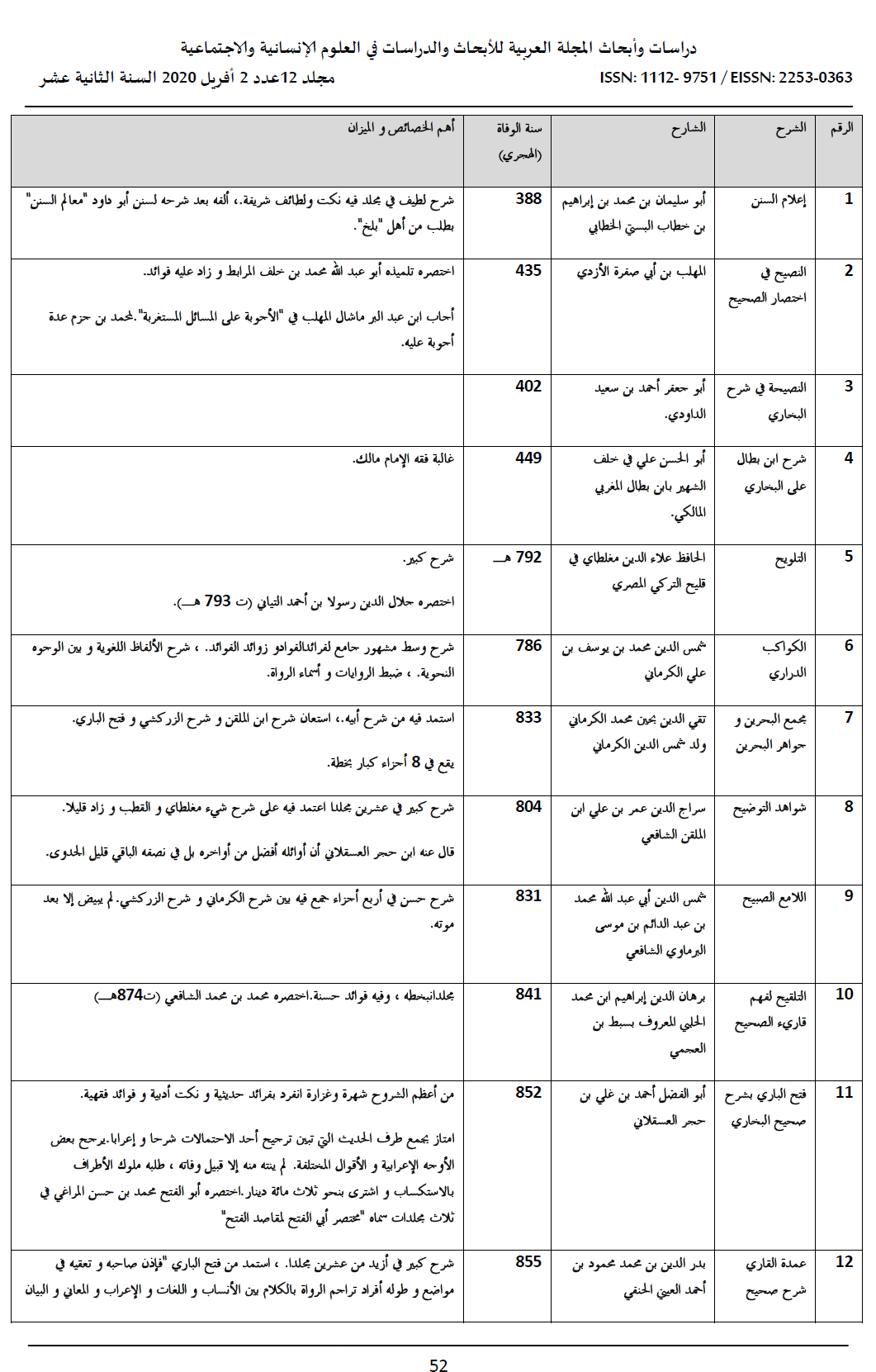
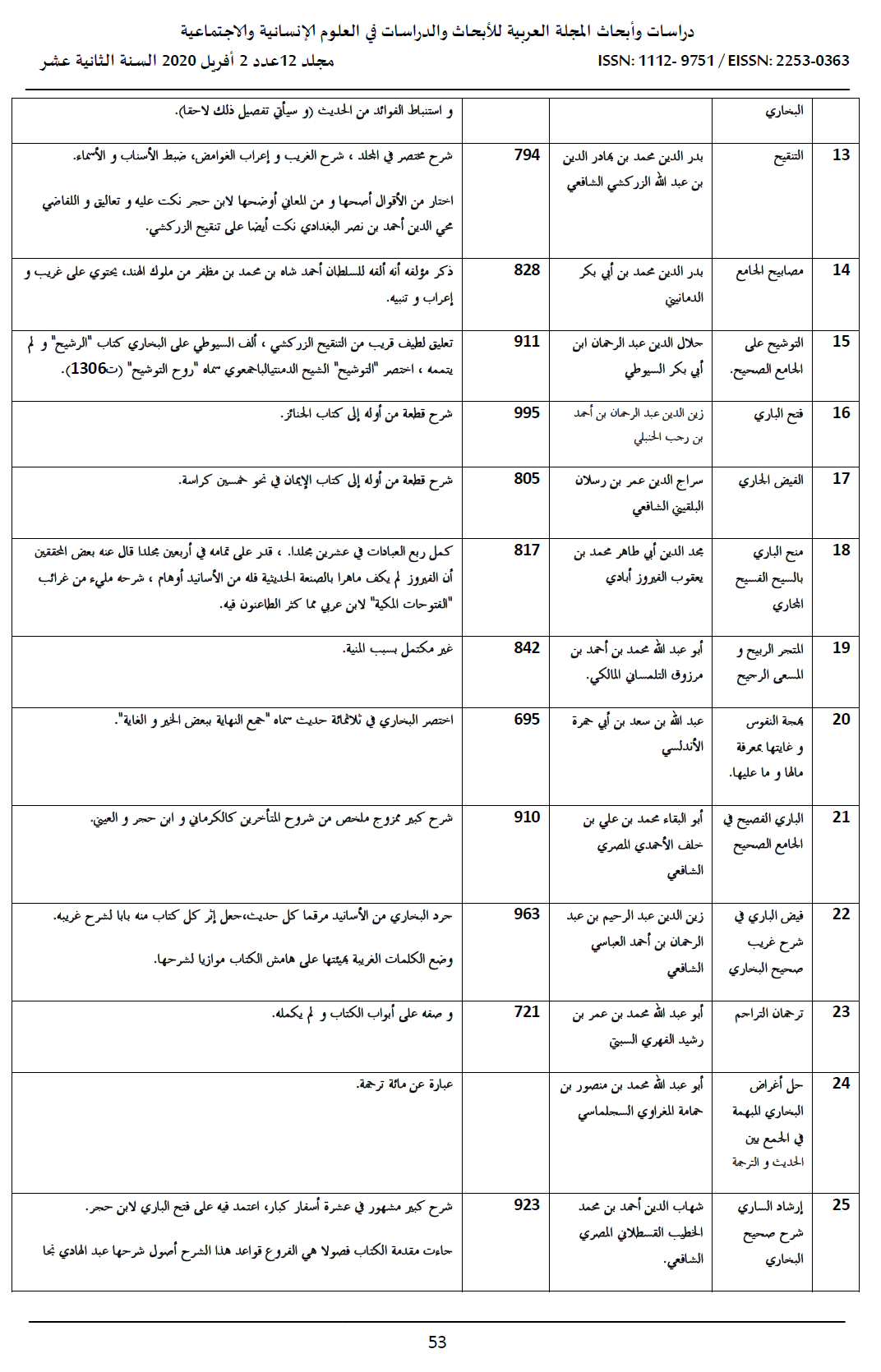
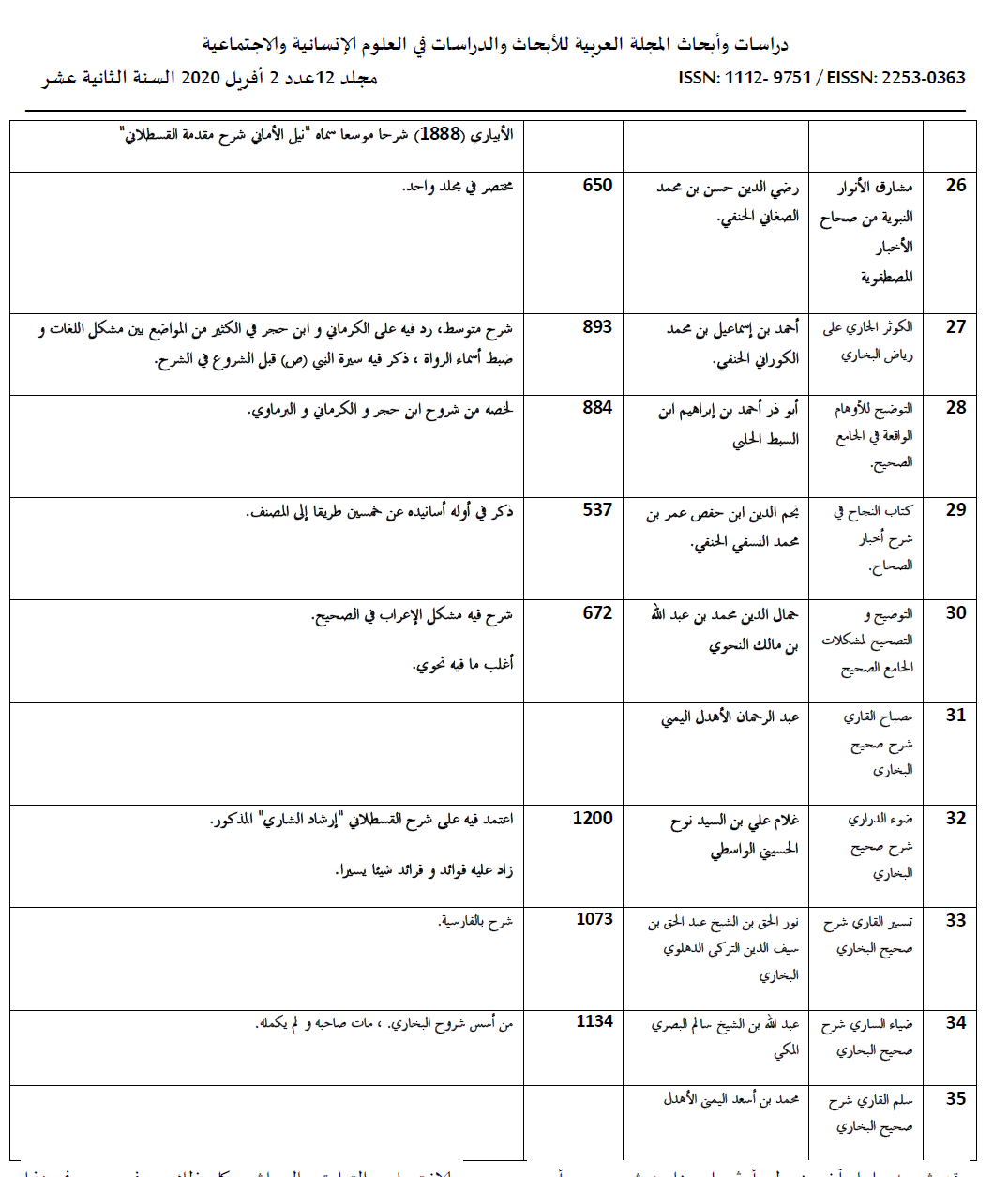
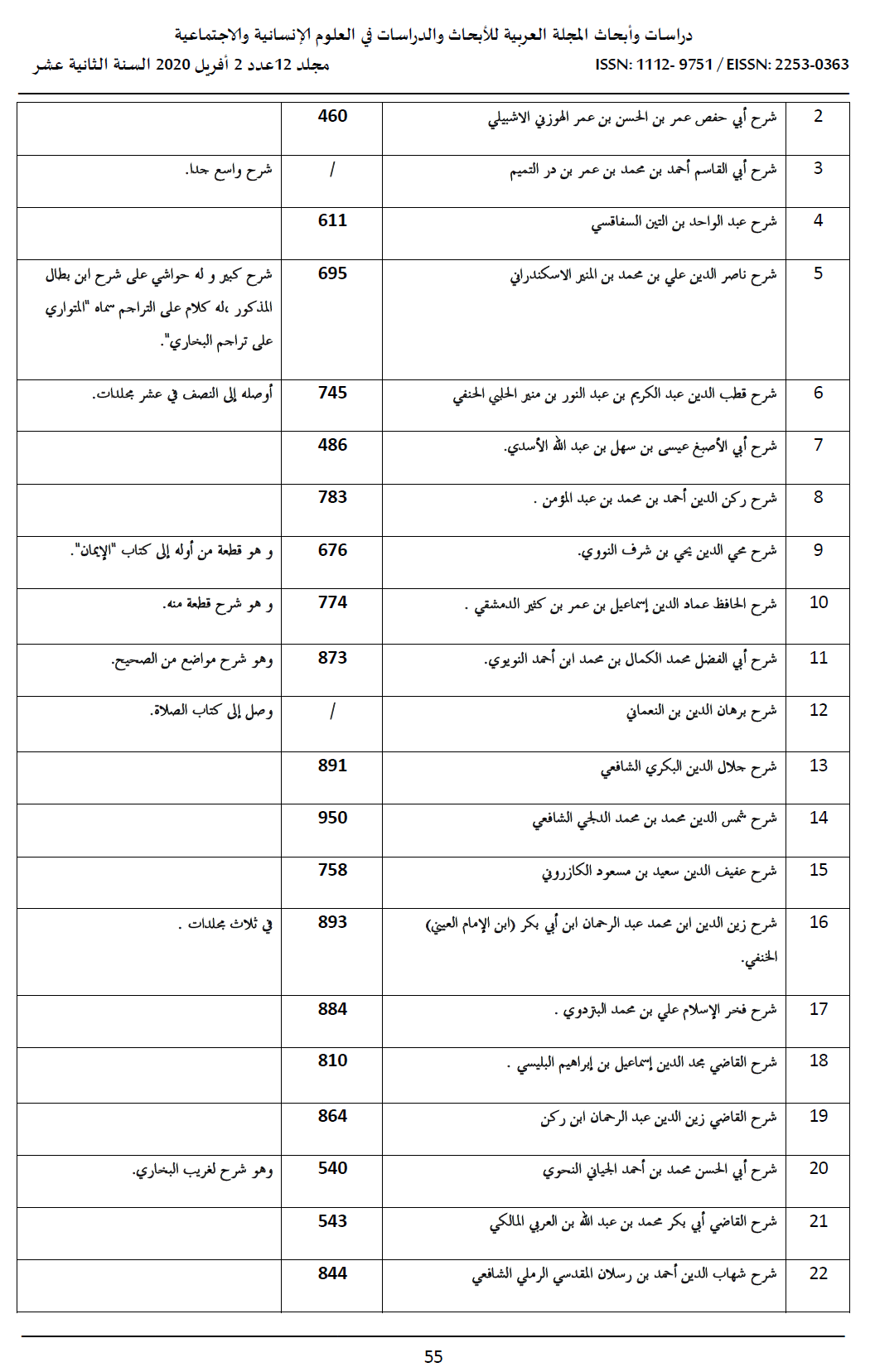
Moroccans’ explanations and our final supplication is that praise be to God, Lord of the Worlds Dr. Ahmed El Shamy https://t.me/Ahmed_elshamy1 09/27/2024
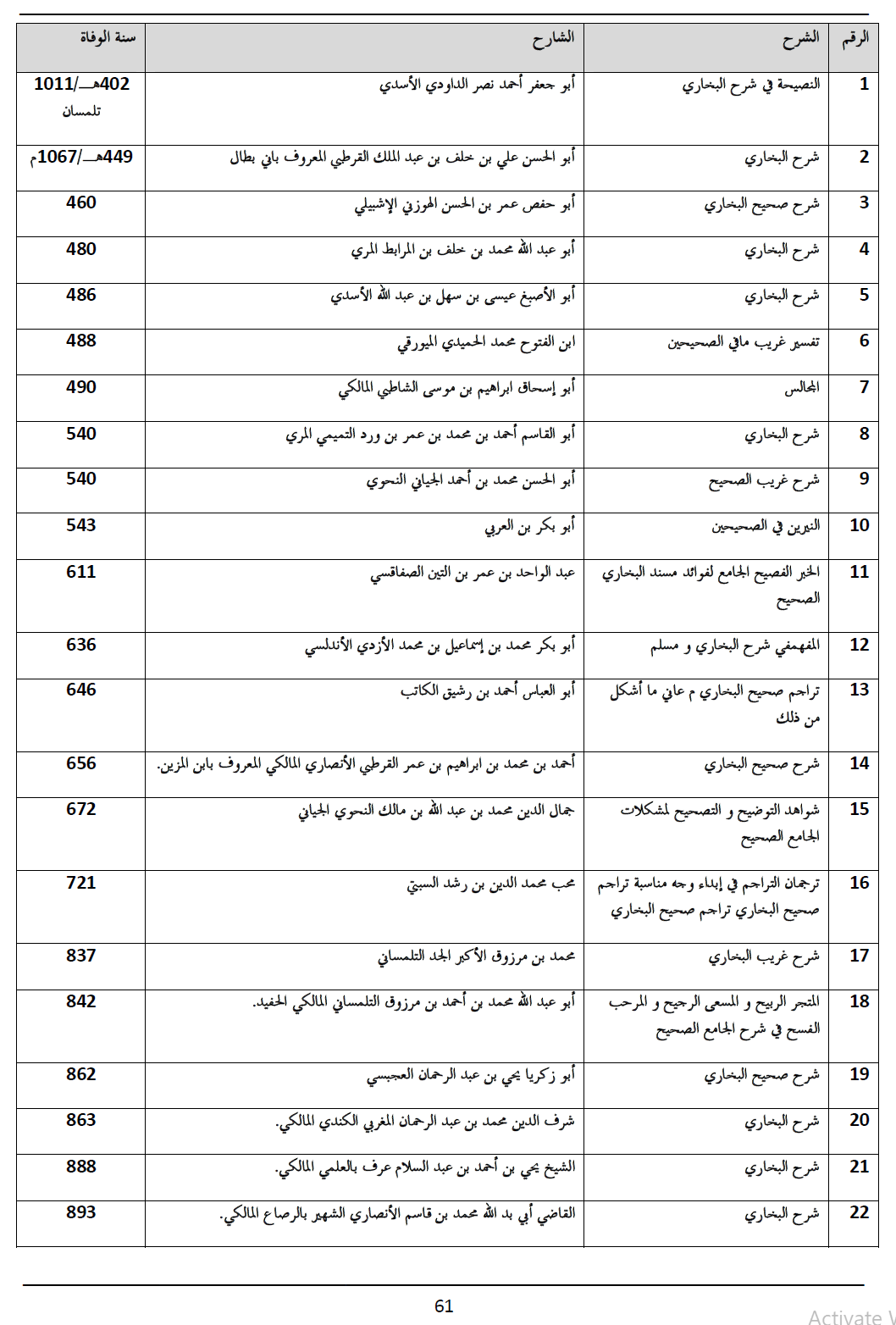
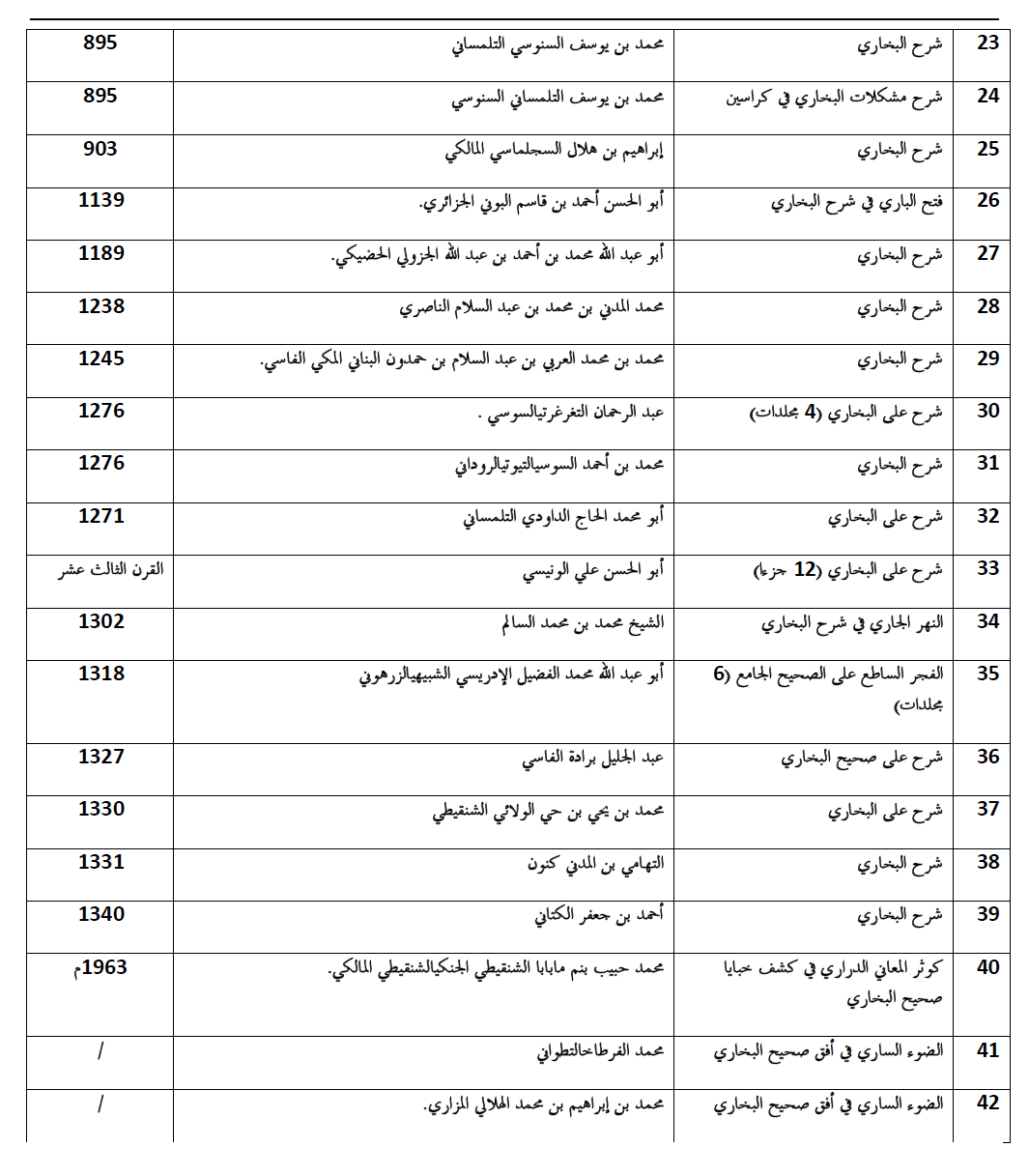
11 https://www.fihrist.org.uk/catalog/manuscript_3801
22 https://www.fihrist.org.uk/catalog/manuscript_3801
33 An Important Manuscript of the Traditions of Bukhari, by A. Mingana, pg1
44 An Important Manuscript of the Traditions of Bukhari, by A. Mingana, pg4
55 An Important Manuscript of the Traditions of Bukhari, by A. Mingana, pg7
66 An Important Manuscript of the Traditions of Bukhari, by A. Mingana, pg8
77 An Important Manuscript of the Traditions of Bukhari, by A. Mingana, pg5
88 An Important Manuscript of the Traditions of Bukhari, by A. Mingana, pg5
99 Index of Arabic Manuscripts Preserved in the National Library: Kirill and Methodius, in Sufi capital of the Bulgarian People’s Republic (two parts in one volume: Part One: The Qur’an and its Sciences, and Hadith and its Sciences, and Part Two: Linguistics and Composition Sciences, prepared by: Al-Darwish, Adnan, published by: Ministry of Culture, Tourism and National Guidance, Damascus, 1969 AD
1010 Haitham Abdul Ghafoor, Ismail bin Abi Uways and his narrations in Sahih Al-Bukhari (Master’s Thesis at the University of Islamic Sciences) p. 6
1111 Haitham Abdul Ghafoor, Ismail bin Abi Uways and his narrations in Sahih Al-Bukhari (Master’s Thesis at the University of Islamic Sciences) p. 6
( 1212 ) See: Seerah ‘Alam Al-Nubala’ by Al-Dhahabi, Vol. 10, p. 392.
( 1313 ) See: Taqrib Al-Tahdheeb (460), Vol. 1, p. 135.
( 1414 ) It is attributed to the Prophet , peace be upon him : that is, it is attributed to him.
( 1515 ) See: Al-Fath, H. 740, Vol. 2, p. 285.
( 1616 ) Al-Fath, Vol. 4, p. 439.
1717 The Weak Chain, Dar Al-Maarif, Riyadh, 1st ed. 1412, 1 AH - 1992 AD, Vol. 3, p. 485.
1818 Explanation of the Creed of Al-Tahawiyyah - Introduction, Islamic Office, Beirut, 1st ed. 1399, 5 AH, pp. 14-15.
1919 “Seer A’lam An-Nubala” (12/402)